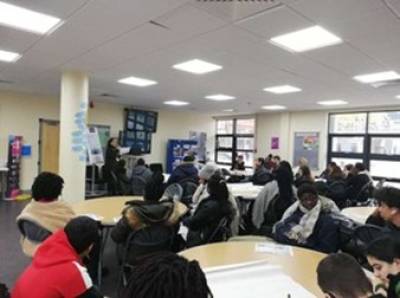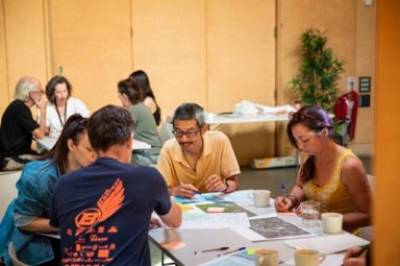I am a Lecturer in Citizen Science in the Department of Geography, since 2022, and a Geography member of the People Nature Lab (UCL Biosciences) at UCL East, where I am responsible for organising and running the new MSc in Ecology and Citizen Science Programme which will launch in September 2024. My research and teaching focus on socio-technical perspectives and concerns that arise from the implementation of public participation approaches, including citizen science, to address social and environmental issues.
- More about Dr Skarlatidou
I studied Geography (Aegean University, Greece) (with a focus on Human Geography), following which I then moved to London to get an MSc in GIScience (UCL). Upon completing my Master's and after a year of working at Transport for London as a GIS Analyst, I returned to UCL to do my Engineering Doctorate (EngD) in Virtual Environments, Imaging and Visualisation (UCL Computer Science), during which I also attended the MSc in Computer Science (UCL Computer Science) and the MSc in Human-Computer Interaction (UCLIC).
During my EngD, I spent a lot of time at Arup, my industrial sponsor, following closely the governmental plan for the disposal of nuclear waste in the UK (2007-2012). My research focused on the trust-building potential of participatory approaches through the mediation of geographic digital interfaces, which I subsequently applied and evaluated in the context of nuclear waste disposal; a controversial topic featuring public distrust. Upon completion of my EngD, I won the EPSRC Doctoral Prize Award (2011) to extend my research in the context of public crime information access via online crime mapping apps.
Subsequently, I did my postdoc in the Extreme Citizen Science group at UCL, where I focused on researching socio-technical and design aspects in the wider implementation of Sapelli, a data collection tool used to empower and include indigenous and local communities and their knowledge into the wider sustainability agenda, while addressing important local issues, and which is designed with a particular focus on non-literate users without prior ICT experience.
During the same time, I also led project Cin City (EPSRC, PI) where I worked with young people in East London to understand the “fear of crime” and perceptions of youth violence and knife crime and trust in policing. Through the direct engagement of those most affected and the investigation of young people’s mental models with respect to their local areas, the project identified locally acceptable and relevant interventions to reduce knife crime and set the basis for collaboration and communication exchange amongst young people and local policing.
I have also worked in the following research projects: Doing It Together Science (Co-I – H2020); WeGovNow (Co-I – H2020). I am currently leading HEIDI (PI), a 2-year European ERASMUS+ project, which looks into community-driven digital action across the UK, France, Malta, Greece and Cyprus. The project aims to investigate and provide guidance for Higher Education Institutions that would enable them to better embrace digital action for social change.
For my research, I heavily rely on my geography background, with theories mainly from Critical GIS/Geoweb and with significant influences from the fields of Human-Computer Interaction and Risk Communication Studies.
- Teaching
I teach on the following modules:
Undergraduate
- Geography in the Field 2 (GEOG0014)
- Digital Geographies (GEOG0164)
Postgraduate
- Data, Politics and Society (GEOG0163)
- Introduction to Citizen Science and Scientific Crowdsourcing (GEOG0152)
- Foundations of Citizen Science (BIOS0035)
- Technology for Nature (BIOS0031)
- Publications
To view Dr Skarlatidou's publications, please visit UCL Profiles:
- Research Interests
My research is grounded to my interdisciplinary background and my vision and long-standing commitment to support creating more just societies and a more sustainable world. Towards this end, I am particularly interested in the democratisation of scientific and policy processes by enabling citizens – especially marginalised and underrepresented individuals and communities – to actively take part in the co-shaping of research and policy agendas.
My research has the following cross-cutting themes:
Socio-technical and design perspectives in the implementation of geographic interfaces and technologies
My research looks into how geospatial technologies are being utilised to support bottom-up participatory processes (in and outside citizen science), the human engagements with these technologies, and socio-technical influences and impacts. Within this context I am particularly interested in technological design perspectives to improve accessibility, support social inclusion and community empowerment. I have recently edited the book: Geographic Citizen Science Design: No one left behind.
YouTube Widget Placeholderhttps://www.youtube.com/watch?v=6k0oaAF_tsY The trust-building potential of bottom-up participatory approaches in science and environmental sustainability
The second line of my research focuses on exploring the trust-building processes of bottom-up participatory approaches (in and outside citizen science) and of the technological artefacts that support these initiatives.
- Impact
Due to my interdisciplinary research contributions across Web GIS, PPPGIS and HCI, I’ve been invited to act as a Vice Chair for the International Cartographic Association’s Commission on UX: Designing the User Experience for 8 years (2012-2020). Also, due to my research contributions to the wider field of Citizen Science I was a Co-Chair of the Cost Action on Citizen science to promote Creativity, scientific literacy and innovation throughout Europe (2016-2020) and I am currently an Associate Editor of the Journal of Citizen science: Theory and Practice.
I have given several invited talks on Citizen Science, including policy organisations, such as the Latvian Ministry of Environment and Education (28/08/2020), and Oxford Talks (24/01/2020).
I have led several projects which aimed at the wider dissemination of citizen science practices and improving wider awareness on the topic; providing training materials for individuals, communities and practitioners. I have therefore contributed to the curation and facilitation of several online materials including online podcasts, YouTube videos and blog posts. During the COVID-19 pandemic, I have been working with citizen science practitioners, members of the public, community and voluntary organisation groups, and academics from various universities across the globe to raise awareness for Digital Action (i.e. hackathons, makeathons and citizen science) for social change and facilitated the #CitizenScience4All Talks series which can be watched below:
YouTube Widget Placeholderhttps://www.youtube.com/watch?v=ANsnjKDRXHo&list=PLUo-VNR0qe32DtWL9tTFL_... A key impact of my work is supporting and empowering local communities to address local issues and protect their own localities using citizen science and geographic interfaces. Through my involvement in the Extreme Citizen Science Group at UCL we’ve been working since 2012 with several indigenous and local communities in Kenya, Brazil, Congo, Cameroon, Namibia, Ethiopia and Ghana (further details can be found on the Extreme Citizen Science pages.
Young people in Hackney participating in the Cin City project exploring fear of crime, youth violence, knife crime and trust in policing perceptions for the local area.
I also worked with young people and police officials in East London, on one of the most pressing issues they are facing related to knife crime and youth violence: to identify locally acceptably and relevant interventions which have the potential to re-establish trust. In August 2022, with academics from UCL East, we also started a new collaboration with local residents in East London to clean up the River Lea.

Photo: Artemis with local residents discussing their concerns about the River Lea. Photo by Kristian Lam-Clark.
- Research Students
Current PhD Students
- Alexa Joyce: Exploring how information and communication technologies (ICT) can help reach the goals of Education for Sustainable Development (ESD) set out by UNESCO in the Global Action Programme in the context of K12 education.
Past PhD Students
- Dr Nikos Papapesios: Explored the usability, usefulness, and trust potential of geospatial metadata provision to support decision-making in the defence sector.
 Close
Close

